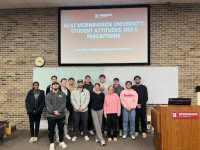 (3.21.17) By Lindsey Smith – Obesity across the world, especially in the United States, has caused waves in the way the medical field views health issues. Medical schooling is the same.
(3.21.17) By Lindsey Smith – Obesity across the world, especially in the United States, has caused waves in the way the medical field views health issues. Medical schooling is the same.
Nursing students react more negatively to obese patients than those that are normal weight, but feel confident they can help their patient be healthier. Shar Georgesen, a professor at Morningside College, discovered this when she set out to research how nursing students would hypothetically approach the topic of obesity with their patients.
She presented her doctoral dissertation titled “Student Nurses and Childhood Obesity” in Buhler Rohlfs Weikert Auditorium on the Morningside College campus as part of the FDC Faculty Colloquium on Tuesday.
In America, 40 percent of children are overweight. Nurses are taught how to screen for this information but not always how to approach the topic with the patients and their families. As one professor said during the discussion, “You have a sore throat, I give you an antibiotic. It’s concrete. You can talk about weight ’til you’re blue in the face and it might not change anything.”
Georgesen found that many students judged patients more harshly if their mother was also obese. She believes that many students are of the Midwest mentality where people are responsible for everything they do. If they’re overweight, it’s more or less their fault.
In her study, Georgesen also found that students offered slightly hypocritical suggestions to fix the patient’s obesity problems. Students suggested that a kid who rode the bus every day should walk, despite not knowing whether he lived in a more remote or rural area or dangerous neighborhood that wouldn’t allow him to walk to school. Georgesen pointed out that many students in college drive from their dorm to classes, a much shorter distance than the hypothetical kid and his school.
Nursing students similarly suggested that children have less than 30 minutes of screen time a day, even though college students spend a significant amount of time on their computers, phones, and other technological devices.
Georgesen especially noted how hard it is for some students to know how to approach the topic of obesity without offending their patients. However, many more students had incredible amounts of confidence in their abilities to have an open discussion with their patients despite their lack of training. While obesity is considered a serious health issue, not many students are taught how to directly advise their patients on how to live a healthier lifestyle. It’s also a more difficult situation in the case of overweight children, as Georgesen said in her presentation, “It requires the whole family to change their behaviors.”
Georgesen’s study required senior nursing students from Iowa, Nebraska, and South Dakota to fill out surveys about how they would deal with hypothetical situations with overweight and normal weight patients. She noted that her survey included a majority of overweight students, almost entirely female, all in the same age group, and all from one region of the country, which had some effect on her results.
While Georgesen’s finds in the Midwest are certainly eye-opening, she doesn’t want to stop her research yet. She hopes to expand her surveys to other regions in the United States, using face-to-face interviews in some cases to get clearer answers than the written surveys.
Georgesen will be presenting her findings at the Midwest Nursing Research Conference in Minneapolis, Minnesota, in early April.






Leave a Reply